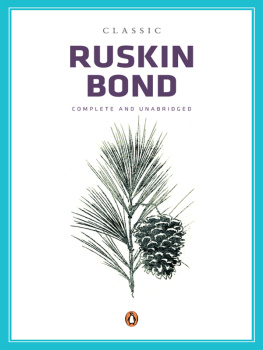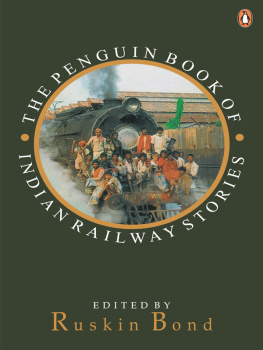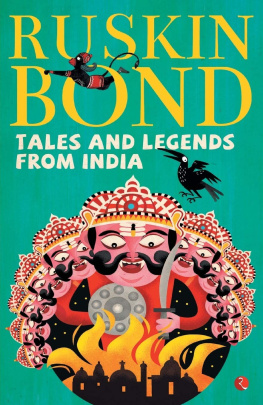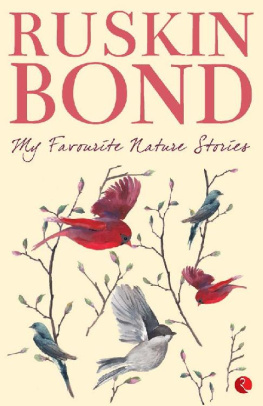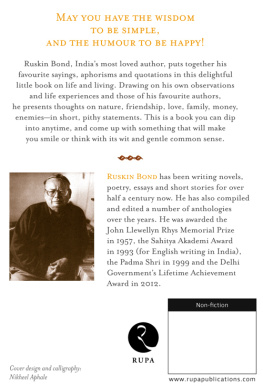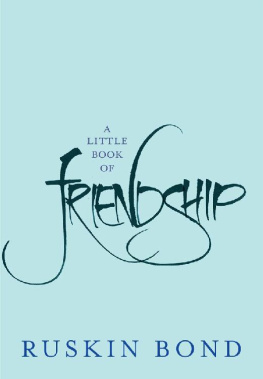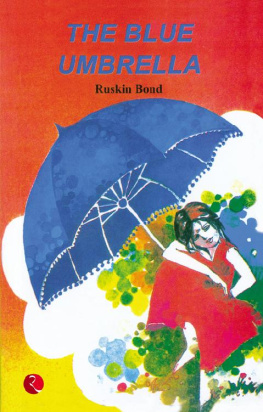falling in love again
Ruskin Bond has been writing for over sixty years, and has now over 120 titles in printnovels, collections of stories, poetry, essays, anthologies and books for children. His first novel, The Room on the Roof, received the prestigious John Llewellyn Rhys award in 1957. He has also received the Padma Shri, and two awards from the Sahitya Akademione for his short stories and another for his writings for children. In 2012, the Delhi government gave him its Lifetime Achievement award.
Born in 1934, Ruskin Bond grew up in Jamnagar, Shimla, New Delhi and Dehradun. Apart from three years in the UK, he has spent all his life in India, and now lives in Mussoorie with his adopted family.
A shy person, Ruskin says he likes being a writer because 'When I'm writing there's nobody watching me. Today, it's hard to find a profession where you're not being watched!'
Published by
Rupa Publications India Pvt. Ltd 2013
7/16, Ansari Road, Daryaganj
New Delhi 110002
Sales centres:
Allahabad Bengaluru Chennai
Hyderabad Jaipur Kathmandu
Kolkata Mumbai
Copyright Ruskin Bond 2013
All rights reserved.
No part of this publication may be reproduced, transmitted, or stored in a retrieval system, in any form or by any means, electronic, mechanical, photocopying, recording or otherwise, without the prior permission of the publisher.
1 0 9 8 7 6 5 4 3 2 1
The moral right of the author has been asserted.
Typeset in Utopia Std 10.5/14.8
Printed by Replika Press Pvt. Ltd., India
This book is sold subject to the condition that it shall not, by way of trade or otherwise, be lent, resold, hired out, or otherwise circulated, without the publisher's prior consent, in any form of binding or cover other than that in which it is published.
To
Vishal and Rekha Bhardwaj,
great artistes,
wonderful people.
Contents
Introduction
I was going through the romantic poets, looking for a quote to head this little introduction, but somehow the right sentiments eluded me. I guess Ive grown too old and jaded to go into raptures over Romeo and Juliet or Laila and Majnu and their tragic ends; all too depressing! So I turned to my old friend P.G. Wodehouse and came up with the following line, which I felt was just right for me:
You know, the way love can change a fellow, is truly frightful to contemplate.
Wodehouses heroes usually make asses of themselves when they fall in love, and so do most of us. Certainly I made an ass of myself time and again (and still do), but when, in my twenties and thirties I sat down to write about my broken heart, I took myself very seriously.
Falling in love is probably the best thing that can happen to a young writer; it gives a certain spontaneity and intensity to his writing. Stories such as The Night Train at Deoli, The Eyes Have It and Time Stops at Shamli were written when I was in my early twenties, and have stood the test of time quite well. Fifty years after they were written they still turn up in anthologies aimed at both the young and the old.
In my thirties I came to live in the hills, and my love stories were now greatly influenced by the world of nature. Thus, Binya Passes By and On Fairy Hill have a magical, other-worldly feeling about them.
The supernatural element also turns up occasionally in a lighter vein, there is The Girl from Copenhagen and Who Kissed Me in the Dark? And sometimes, in a contemplative mood, I write the occasional poem.
I havent stopped writing about love. My life has been one long love story, and I have loved people, I have loved books, I have loved flowers, the sun, moon and stars, old roads, old trees, children, grannies, butterflies, seashells, fairies... And of course I keep falling in love, for where love begins, there is the border of heaven.
Ruskin Bond
January 2013
The Eyes Have It
had the train compartment to myself up to Rohana, then a girl got in. The couple who saw her off were probably her parents. They seemed very anxious about her comfort and the woman gave the girl detailed instructions as to where to keep her things, when not to lean out of windows, and how to avoid speaking to strangers.
They called their goodbyes and the train pulled out of the station. As I was totally blind at the time, my eyes sensitive only to light and darkness, I was unable to tell what the girl looked like. But I knew she wore slippers from the way they slapped against her heels.
It would take me some time to discover something about her looks and perhaps I never would. But I liked the sound of her voice and even the sound of her slippers.
Are you going all the way to Dehra? I asked.
I must have been sitting in a dark corner because my voice startled her. She gave a little exclamation and said, I didnt know anyone else was here.
Well, it often happens that people with good eyesight fail to see what is right in front of them. They have too much to take in, I suppose. Whereas people who cannot see (or see very little) have to take in only the essentials, whatever registers tellingly on their remaining senses.
I didnt see you either, I said. But I heard you come in.
I wondered if I would be able to prevent her from discovering that I was blind. Provided I keep to my seat, I thought, it shouldnt be too difficult.
The girl said, Im getting off at Saharanpur. My aunt is meeting me there.
Then I had better not get too familiar, I replied. Aunts are usually formidable creatures.
Where are you going? she asked.
To Dehra and then to Mussoorie.
Oh, how lucky you are. I wish I were going to Mussoorie. I love the hills. Especially in October.
Yes, this is the best time, I said, calling on my memories. The hills are covered with wild dahlias, the sun is delicious, and at night you can sit in front of a log fire and drink a little brandy. Most of the tourists have gone and the roads are quiet and almost deserted. Yes, October is the best time.
She was silent. I wondered if my words had touched her or whether she thought me a romantic fool. Then I made a mistake.
What is it like outside? I asked.
She seemed to find nothing strange in the question. Had she noticed already that I could not see? But her next question removed my doubts.
Why dont you look out of the window? she asked.
I moved easily along the berth and felt for the window ledge. The window was open and I faced it, making a pretence of studying the landscape. I heard the panting of the engine, the rumble of the wheels, and, in my minds eye I could see telegraph posts flashing by.
Have you noticed, I ventured, that the trees seem to be moving while we seem to be standing still?
That always happens, she said. Do you see any animals?
No, I answered quite confidently. I knew that there were hardly any animals left in the forests near Dehra.
I turned from the window and faced the girl and for a while we sat in silence.
You have an interesting face, I remarked. I was becoming quite daring but it was a safe remark. Few girls can resist flattery. She laughed pleasantlya clear, ringing laugh.





